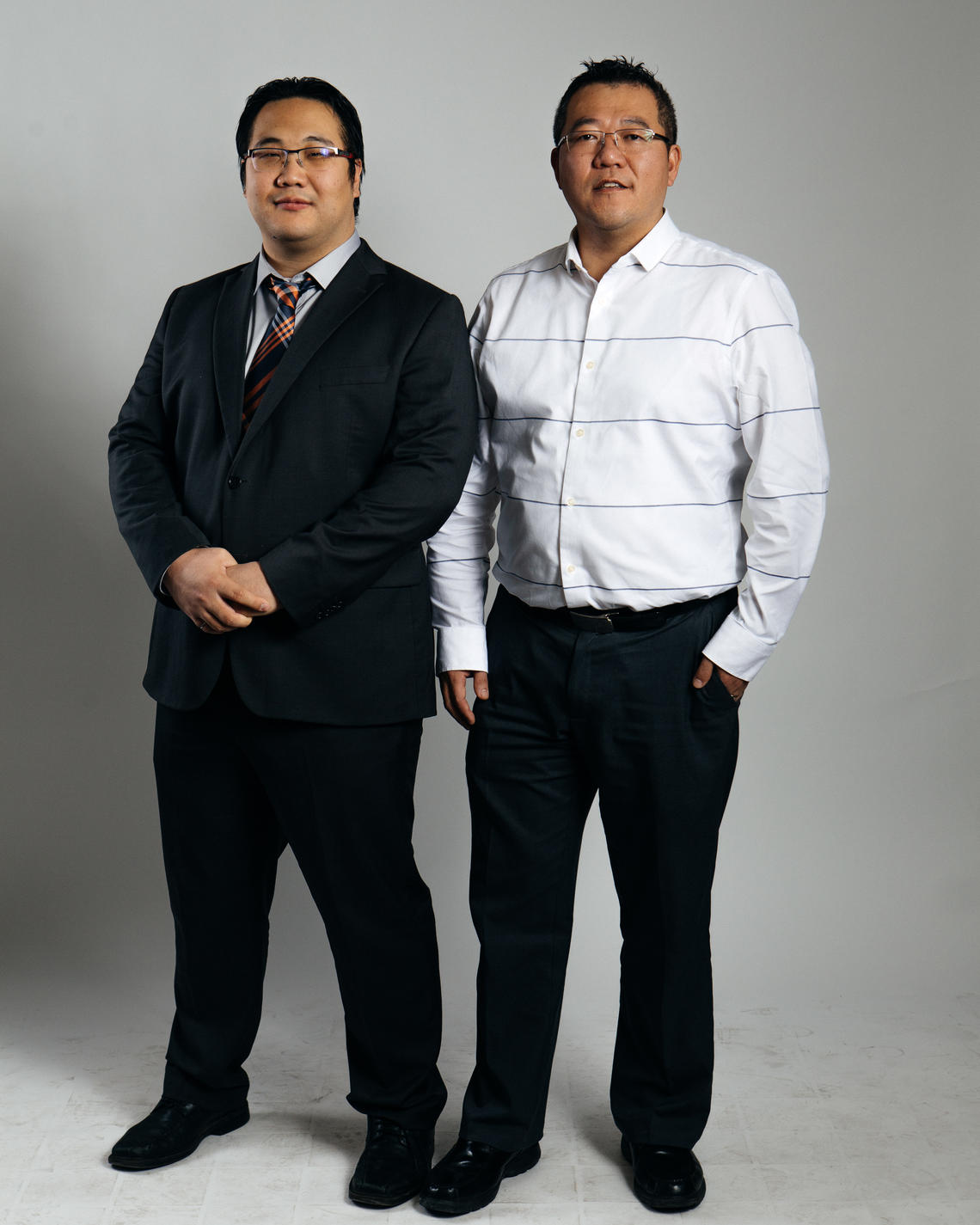May 14, 2018
Lessons learned: Life after CDL-Rockies

Schulich School of Engineering’s Chaneel Park, left, and Simon Park of MakeSens.
Kelly Hofer, for the Haskayne School of Business
Engineers Chaneel Park, Allen Sandwell and Simon Park didn’t have any business experience when their copper-ink project became one of 25 ventures accepted into the first year of the Creative Destruction Lab Rockies. Then suddenly, their three years of laboratory research into flexible, non-corroding copper composite inks for electronics fast-tracked itself into a competitive electronics market where no one else has figured out how to use copper in the same way.
“We weren’t even incorporated,” says Chaneel Park, now CEO of MakeSens, which he co-founded in late 2017 with fellow University of Calgary PhD student (and now CTO) Allen Sandwell, and UCalgary professor of mechanical and manufacturing engineering Simon Park (now also a MakeSens director).
MakeSens made it to the second round of the inaugural CDL-Rockies, an intensive nine-month business startup bootcamp based out of the Haskayne School of Business at the University of Calgary. In 2017, 25 ventures were accepted into the program that puts new science-focused ventures though a series of eight-week sprints in an effort to bring products to market.
For each sprint, CDL Fellows and Associates — top entrepreneurial mentors and angel investors — help each venture set several milestone goals. Each venture is then assessed based on its progress in the last eight weeks — as well as its potential moving forward — with at least one company dropped from the program at each sprint stage.
MakeSens’s second round CDL-Rockies exit
“It was an exciting moment, to get into the second round,” says Park. “But we were still too embryonic. We were still figuring out our intellectual property transfer from the university and Innovate Calgary, and we were still deciding how to pivot from not just selling the parts for connectivity, but how to actually mass produce a sensor — to augment the technology further to make an end product.”
The process of CDL is about resolving uncertainty as you try to move your company forward, says Michael Robinson, CDL-Rockies lead, and an associate professor of entrepreneurial finance in the Haskayne School of Business. “It’s a very condensed process. Sometimes the uncertainty is not resolved and the world does not unfold according to our timeline,” he says. “So a venture that exits gets a chance to go back and reflect, maybe build their management team, maybe tighten up their research a little bit, and hopefully even come back another year with a more focused approach than they had.”
MakeSens after CDL-Rockies
MakeSens has now completed its IP transfer. And it is developing its flexible, stretchable sensor technology for industrial applications. It is collaborating with a local oil industry company on a proof-of-concept sensor that can wrap around and monitor the sharp corners of pipelines.
“We’ve got an MVP, a minimum viable product,” says Park. “But it was the guidance from CDL that made us into what we are now. Without that, we would probably have gone in a wrong direction. CDL’s tight deadlines made us faster and taught us how to operate. And even after we exited the program, our mentors helped us out.”
Through the business network MakeSens built at CDL, it was able to connect with Haskayne’s Hunter Centre for Entrepreneurship and Innovation and the 2018 MBA 24 Hour EPIC Case Challenge. So not long after it exited CDL-Rockies, MakeSens was right back in the entrepreneurial thick of things as 10 EPIC Case Challenge teams from different universities used MakeSens as their case study.
“We gained so many unique ideas from EPIC,” says Park. “Not all the ideas were viable to us, but they were very valuable to us. They gave us more confidence that we should or shouldn’t go in certain directions.”
Building a network of entrepreneurial support
One of the best things about CDL, says Robinson, is that the program is not in competition with other initiatives that are also trying to help startups. “We are a conduit,” he says. “It’s not a competition between the organizations trying to help startups. We’re all trying to build a community of collaboration and, in some way, all work together.”
CDL-Rockies is working on partnerships with the NRG COSIA Carbon XPRIZE competition, the Cumming School of Medicine’s TENET i2c competition and the Hunter Hub programs, to name but a few. The goal is for finalists or semi-finalists from these programs to get some kind of special consideration to reach CDL’s interview selection round. CDL also works closely with Innovate Calgary, Calgary Technologies Inc., TEC Edmonton, Alberta Innovates, Alberta Enterprise Corporation, Venture Mentoring Service of Alberta, the National Research Council Canada’s Research Associate Program and more. “These organizations see us as a partner in what we are trying to do,” says Robinson.
Fall forward and try again
Just because a venture didn’t finish the whole nine-month CDL process doesn’t mean the company failed, says Robinson. “Just because you didn’t finish doesn’t mean you didn’t get something out of the program.” Also, companies are allowed, even encouraged, to reapply. With that in mind, MakeSens has already filed its CDL-Rockies application for 2018.
“CDL is about thinking big,” says Park. “It’s about showing the possibilities of what your business can do in the future, not just right now. They don’t care if you are fully developed yet.” Park, along with his fellow founders Allen Sandwell and Simon Park, are doing just that — they are not only focused on pipeline sensors. They are also contemplating how their flexible copper-ink technology will work in all kinds wearable devices, clothing, moving computers, medical patches, and more. “There are all kinds of problems we can solve,” says Park.
